The Worst Thing Is The Sense Of Being A Stranger In Your Own Land And Feeling That Not A Single Part Of It Is Yours. - Raja Shehadeh, a Palestinian lawyer -
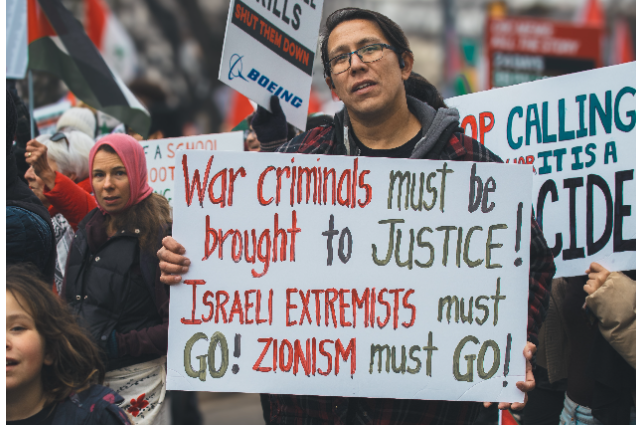
Introduction
This article probes into the complex and contentious issue surrounding Israel's alleged hidden agenda and purported violations of international law. The Middle East has been a hotbed of geopolitical tensions for decades, with Israel at the centre of much scrutiny. This study aims to provide an impartial and comprehensive examination of the claims against Israel, focusing on potential breaches of international law.
The establishment of the State of Israel in 1948 marked a significant turning point in the geopolitics of the Middle East. Over the years, various actors have accused Israel of pursuing a hidden agenda that includes territorial expansion, human rights abuses, and non-compliance with international norms. This article seeks to evaluate these claims with a critical lens and analyses whether there is credible evidence to support the allegations.
Territorial Expansion and Settlements
One of the primary accusations against Israel involves its expansionist policies, particularly in the occupied territories. Critics argue that Israel's establishment of settlements in the West Bank and East Jerusalem violates international law, specifically the Fourth Geneva Convention. This section explores the legal implications of Israel's settlement activities and their impact on the ongoing Israeli-Palestinian conflict.
Since the commencement of the occupation in June 1967, Israel's policies of land confiscation, illegal settlement, and dispossession, along with widespread discrimination, have caused immense suffering for Palestinians, depriving them of fundamental rights.
The military rule imposed by Israel profoundly disrupts every aspect of daily life in the Occupied Palestinian Territories.
It dictates whether, when, and how Palestinians can travel to work or school, go abroad, visit relatives, earn a living, participate in protests, access farmland, or even obtain electricity and clean water.
This situation translates into daily humiliation, fear, and oppression, where the entirety of people's lives is effectively held hostage by Israel.
In response to dissent against its policies, Israel has implemented a complex array of military laws, and senior government officials have labelled Israelis advocating for Palestinian rights as "traitors."
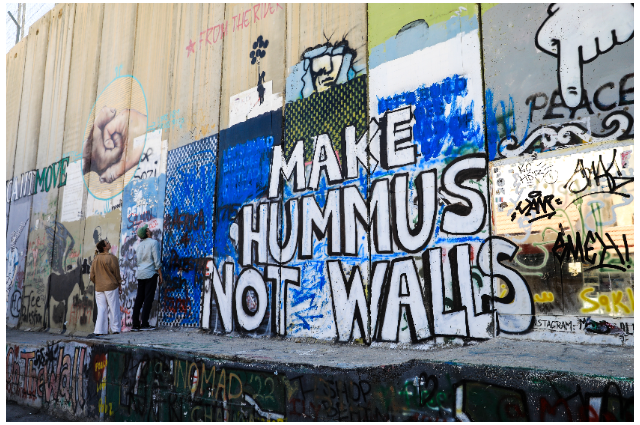
An authoritative United Nations figure emphasized to the Security Council the Secretary-General's plea for ending the Israeli occupation and resolving the conflict to achieve a two-state solution. The official highlighted the expansion of Israeli settlements, destruction of Palestinian structures, daily violence, and provocative statements from the Israeli Government. The United Nations Special Coordinator for the Middle East Peace Process, Tor Wennesland, reported ongoing settlement activities, citing plans for 6,300 housing units in Area C and about 3,580 units in East Jerusalem just before the attack of October 7th by Hamas. He noted the Israeli Government's administrative actions expediting settlement expansion and the resulting departure of Palestinians, including children, due to violence and shrinking land.
Al Jazeera presented statistics of around 15000 Palestinians killed including 6000 plus children by Israeli forces. Wennesland emphasized the urgent funding needs of UNRWA and WFP and conveyed the Secretary-General's call for Israel to halt settlement activity, demolitions, and seizures of Palestinian structures.
15000 Palestinians killed including 6000 plus children by Israeli forces
Council members condemned the Israeli settlements as a breach of international law and urged their cessation. Concerns were raised about the ongoing violence and lack of political progress on the thirtieth anniversary of the Oslo I Accord, with calls for restraint and de-escalation.
The U.S. representative expressed concern about the violence's impact on peace prospects and emphasized opposition to settlements, urging Israel to refrain from such actions. Other speakers called for the lifting of the Gaza blockade, highlighted budget constraints in Palestinian territories and stressed the importance of UNRWA's core services. Some proposed solutions, include prioritizing the Palestinian issue internationally, convening an international peace conference, and supporting initiatives incentivizing negotiations.
France's representative and others reiterated support for a two-state solution with Jerusalem as the capital for both, endorsing the European Union, Saudi Arabia, and the League of Arab States' initiative to prepare measures benefiting both parties post-peace agreement. The United Arab Emirates called for intensified diplomatic efforts to reduce escalation, emphasizing the need for direct negotiations between Israel and Palestine. Brazil's representative criticized the Council's unresponsiveness, urging reflection on its role in facilitating direct negotiations and warning against inaction.
Human Rights Concerns
Allegations of human rights abuses by Israeli authorities have been widely reported. This section investigates claims of excessive use of force, unlawful detention, and the restriction of movement in the occupied territories. The article examines the role of international human rights law in evaluating these allegations and considers the perspectives of both Israeli authorities and their critics.
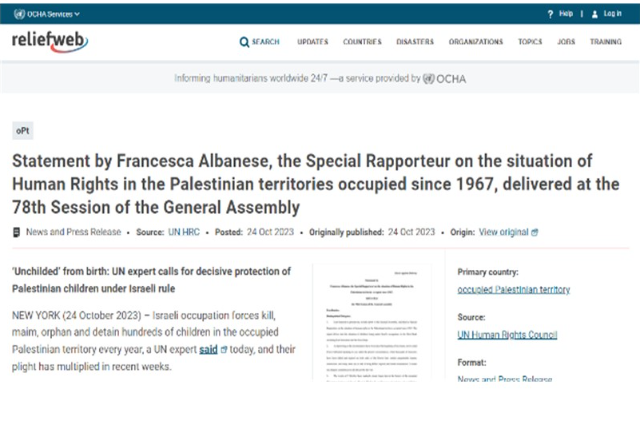
Ms. Albanese contends that the international community has not adequately supported efforts to end hostilities between Israel and Palestine. She criticizes the missed opportunity for the international community to demonstrate balanced support for both Israelis and Palestinians.
Ms. Albanese specifically points out the suffering of Palestinians even before October 7th and criticizes Western countries, with some exceptions, for unequivocal support of Israel despite alleged human rights violations. She calls for Israel's actions to align with international law.
Additionally, Ms. Albanese urges the Arab world to condemn Hamas' targeting of civilian targets while expressing solidarity with Palestine. She emphasizes the importance of standing in solidarity with the Palestinians while also condemning what she perceives as atrocities committed by Hamas.
Section 502B(c) outlines a process allowing Congress to request a statement from the State Department regarding the human rights situation in a specific country, the rationale for assisting that country, and any relevant information related to human rights. While asserting that Israeli authorities do not endorse political killings, disappearances, torture, or cruel treatment, the reports acknowledge that possession and distribution of literature deemed hostile by "illegal Palestinian organizations" are punishable offences. Additionally, displaying the Palestinian flag or expressing Palestinian nationalist sentiments is strictly prohibited.
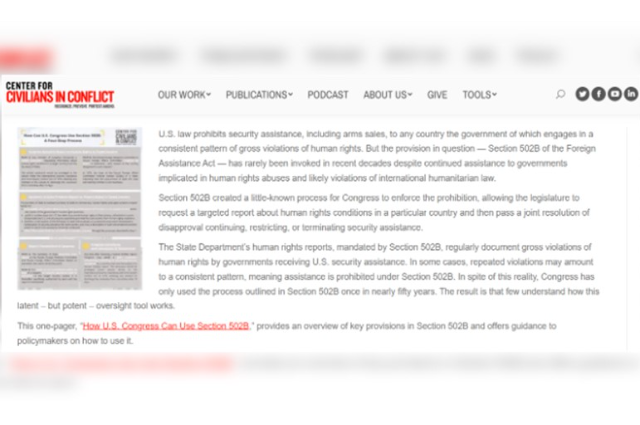
The reports highlight instances where Israeli Arabs (occupied Palestinians) faced legal consequences for displaying Palestinian flags during a peaceful rally. They acknowledge legal advantages conferred upon Israeli Jews, such as freedom of movement, not enjoyed by Israeli Arabs. The reports discuss the denial of the right of return for Palestinian refugees and their proportional underrepresentation in the Knesset. Disparities in budget allocation for Israeli Arab local councils, differences in the education system quality, and limitations on land use rights are also outlined.
In the occupied territories since 1967, the reports assert that Palestinians face more severe human rights violations. The U.S. perspective is that Israel's presence is governed by international regulations. Friction between Israeli authorities and Palestinians is attributed to unilateral annexation, introduction of Jewish settlers, and collective punishment. Military authorities, under occupation rules, can enter private spaces without warrants, and residents are subject to identity checks. Israel's appropriation of land for settlements, military purposes, and road plans is deemed a major violation, limiting Palestinian access to significant portions of the West Bank and Gaza. Water scarcity disproportionately affects Palestinians due to the allocation for Jewish settlers' use. Other violations include the closure of newspapers and universities without clear definitions of "politically significant" or "security grounds."
The International Federation for Human Rights (FIDH) expresses deep concern over a significant rise in human rights violations against Palestinians in the occupied territory and Palestinian citizens of Israel. While urging an immediate ceasefire to halt civilian targeting and facilitate humanitarian aid into Gaza, FIDH underscores the alarming escalation of severe human rights abuses throughout Israel and the occupied territories. FIDH asserts that unconditional support for Israel by certain states implicates them in documented human rights abuses.
Since October 7, 2023, FIDH's Palestinian and Israeli-based member organizations have documented a surge in human rights abuses, including apartheid measures, mass civilian killings, war crimes, and crimes against humanity in Gaza. Israel's actions in the West Bank involve settler violence, forced displacement, and depopulation of Palestinian villages. The report highlights a disturbing rate of extrajudicial killings, a shoot-to-kill policy, and attacks by Israeli settlers with impunity.
In Israeli detention facilities, the number of Palestinian prisoners has sharply increased, accompanied by punitive measures such as water and electricity supply restrictions. Denial of access to prisoners by the International Committee of the Red Cross (ICRC) and families, along with limitations on lawyer visits, raises concerns about ill-treatment and collective punishment. Reports indicate arbitrary arrests and incommunicado detentions of Palestinian workers from Gaza, with signs of ill-treatment.
In Israel, there is a crackdown on freedom of speech for those expressing dissent over Israel's actions in Gaza, with arrests and interrogations related to alleged speech-related charges. FIDH's member organizations describe a targeted "witch hunt" against those advocating for Palestinian human rights.
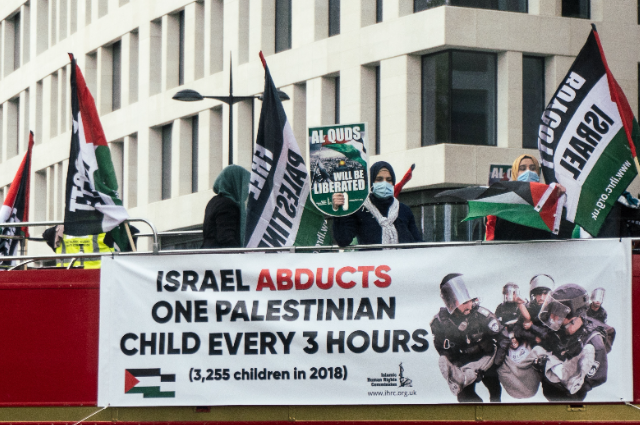
Photo by Mohammed Ibrahim on Unsplash
FIDH emphasizes that these human rights violations are part of a broader system of oppression, including the illegal occupation and apartheid against Palestinians.
FIDH calls for an urgent ceasefire, an end to the blockade of Gaza, unrestricted humanitarian aid, and the release of hostages.
Furthermore, FIDH urges third states and the International Criminal Court (ICC) to promptly address the international crimes committed in Israel and against the Palestinian people.
The Role of International Law
International law serves as a crucial framework for assessing the actions of nations on the global stage. This section provides an overview of the relevant international legal instruments and their applicability to the Israeli-Palestinian conflict. It assesses the extent to which Israel's actions align with or contravene established international norms.
In the context of international humanitarian law, the ongoing Israeli-Palestinian conflict raises complex questions regarding its classification.
The conflict can be interpreted in two ways: as a non-international armed conflict between Hamas (an armed group) and Israel (a State), or as an international armed conflict due to the occupation prevailing in Palestinian territories since the Six-Day War of 1967.
In a previous analysis from 2012, it was argued that, despite Israel's unilateral withdrawal of troops from the Gaza Strip in 2005, the territory remained under Israeli occupation. The control exerted by Israel over borders, passports, currency, and the ability to cut off the power supply in Gaza is cited as evidence of continued control.
Regardless of the conflict's classification, deliberate targeting of civilians and taking hostages is strictly forbidden under international humanitarian law. Acts of violence with the primary aim of spreading terror among the civilian population are also prohibited.

Concerning the notion of a "total siege" of the Gaza Strip, it is noted that while a siege itself is not prohibited, its effects often lead to violations of international humanitarian law. For instance, preventing the delivery of food or water can result in the starvation of the population, a method of warfare explicitly prohibited. Similarly, restricting the movement of people impedes humanitarian personnel from carrying out relief work, contrary to the obligation to facilitate their passage.
The escalation of violence observed in the conflict, including the initial acts and responses, is argued to lead to significant violations of international humanitarian law and potential war crimes. Despite concerns about the effectiveness of international humanitarian law, promoting respect for this law is emphasized as crucial, even in situations of abuse. States not directly involved in the conflict, including Canada, are reminded of their obligation to ensure respect for international humanitarian law in their interactions with the parties involved. The Complaints raised to the court:
1. International Criminal Court (ICC) Complaints
- Reporters Without Borders (RSF) filed a complaint on October 31 to the ICC, citing war crimes against journalists in Israel and Palestine.
- Nine Israeli families impacted by the Hamas attack on October 7 filed a complaint on November 2 at the ICC for war crimes, crimes against humanity, and genocide.
- A collective of a hundred jurists filed a complaint on November 8 for genocide in Gaza.
2. Human Rights Organizations Complaint
- Three Palestinian human rights organizations (Al-Haq, Al Mezan, and the Palestinian Centre for Human Rights) filed a complaint on November 8 with the ICC for war crimes, apartheid, genocide, and incitement to genocide.
3. ICC Investigation
- The ICC has announced its intention to investigate possible war crimes committed in both Israel and Gaza, with a focus on hostage-taking and Israel's obligation to comply with the laws of armed conflict.
4. International Court of Justice (ICJ) Advisory Opinion
- Public hearings are set for February 2024 by the ICJ on the legal consequences arising from Israel's policies and practices in the Occupied Palestinian Territory, including East Jerusalem. This is based on a request for an advisory opinion from the United Nations General Assembly.
It's important to note that these legal actions and complaints reflect the complex and contentious nature of the Israel-Palestine conflict, involving allegations of war crimes, human rights abuses, and violations of international law. The outcomes of these legal proceedings will depend on the assessments made by the respective courts.
Geopolitical Context
Understanding the geopolitical context is essential for a nuanced analysis of Israel's alleged hidden agenda. This section explores the historical, political, and regional dynamics that contribute to the complexity of the Israeli-Arab conflict. It considers the influence of external actors and their impact on the situation.
In the early hours of Saturday, the militant group Hamas initiated an unprecedented attack on Israel, catching intelligence officials worldwide off guard. In response, Israel declared war and launched retaliatory actions against the Gaza Strip, controlled internally by Hamas and under Israeli military blockade since 2007. The ongoing conflict has resulted in the deaths of hundreds of Israeli and Palestinian soldiers and civilians, showing no signs of abatement and potentially expanding to new fronts.
At its core, the Israeli-Palestinian conflict revolves around a land dispute, specifically, determining the right to inhabit the territory between the Jordan River and the Mediterranean Sea and the conditions under which such habitation is permissible. The delineation of Israel's boundaries has never been officially specified, but the international community largely acknowledges the 1949 armistice lines between Israel and its Arab neighbors. These lines, marking the separation of Jerusalem into eastern and western sectors and establishing the West Bank and Gaza as geopolitical entities, are considered by many as the recognized borders. The West Bank and Gaza collectively constitute the "Palestinian territories," even though Palestinians have not had full control over their governance.
The recent escalation of violence primarily focuses on the Gaza Strip, situated in the south, which has become the target of an Israeli military offensive.
In the early 20th century, heightened antisemitism in Europe and the emergence of the Zionist movement propelled increased Jewish immigration to the British mandate for Palestine a region delineated between the Jordan River and the Mediterranean Sea. The United Nations, responding to escalating tensions between Palestinians and Zionist militias and influenced by the aftermath of the Holocaust, proposed a partition of Palestine into distinct Jewish and Arab states in 1947. The internationalization of Jerusalem was also proposed. While most Jewish groups supported this plan, Arab entities and the governments of Arab states rejected it, leading to intensified hostilities and the non-implementation of the U.N. blueprint.
Upon the dissolution of the mandate by Britain in May 1948, Zionist leaders proclaimed the establishment of Israel as an independent state.
This declaration prompted the invasion of Israel by a coalition of Arab nations, including Egypt, Iraq, Syria, and Transjordan, resulting in the first Arab-Israeli War. The territorial gains by Israeli forces led to the displacement of thousands of Palestinians, marking the "Nakba" or catastrophe.
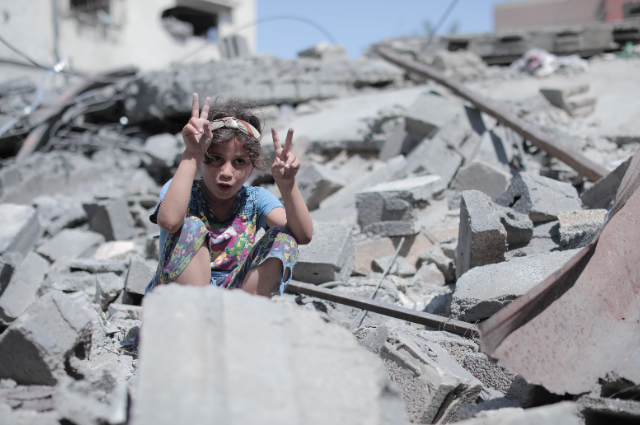
Following the war, Jordan annexed East Jerusalem and a contiguous area, while Egypt occupied a coastal strip north of the Sinai Peninsula, encompassing Gaza. Many Palestinian refugees sought refuge in these occupied territories. Jordan's region became known as the "West Bank," and Egypt's as the "Gaza Strip." Armistice agreements were reached between Israel and its Arab adversaries in the subsequent year.
The Six-Day War in 1967 saw Israel launching pre-emptive strikes against Egypt and Jordan, resulting in the acquisition of East Jerusalem, the West Bank, the Gaza Strip, and the Sinai Peninsula. While Sinai was progressively returned to Egypt starting in 1979 through peace negotiations, Israel has maintained control over the other territories. In 1980, Israel formally annexed East Jerusalem, refraining from a similar declaration in the West Bank and Gaza. Instead, it embarked on an extensive settlement enterprise in both regions, widely considered illegal. Although Israel withdrew from Gaza settlements in 2005, it significantly expanded settlements in the West Bank.
A brief period of optimism following the Oslo Accords in the mid-1990s hinted at the potential for the West Bank and Gaza to coalesce into an independent Palestinian state. However, the implementation of the accords unraveled amidst escalating political violence, including the assassination of Israeli Prime Minister Yitzhak Rabin and the onset of the Second Intifada.
The West Bank is currently governed under a follow-up treaty to the first Oslo Accord, establishing the Palestinian Authority (PA). However, the PA's authority is considered limited, acting primarily as a security subcontractor to Israel. Led by President Mahmoud Abbas, the PA officially manages only 18 percent of the West Bank (Area A), with Israeli forces retaining the ability to enter this area at will. Administrative control of another 22 percent (Area B) is held by the PA, while security control is maintained by the Israeli military. The majority of the West Bank (60 percent, known as Area C) is under Israeli control, allocated for Israeli settlements.
Many human rights organizations characterize the conditions faced by West Bank Palestinians as akin to apartheid, and some argue that the territory is de facto annexed.
In Gaza, initially governed by the PA along with the West Bank, control was lost after the 2006 elections when Hamas defeated Fatah. Following a civil war in 2007, Hamas took over Gaza, prompting a blockade by Israel and Egypt. The blockade has been criticized as a form of "collective punishment," leading to Gaza being referred to as an "open-air prison." Israel and Egypt regulate who and what can enter and exit Gaza, control its electricity supply, and conduct military operations. Gaza's economic decline and humanitarian crisis have been exacerbated by the blockade, with a significant reliance on aid for survival. The UN considers Israel's occupation of Gaza ongoing, despite the 2005 disengagement.
The undemocratic PA, led by Abbas, has not held national elections since 2006, partly due to concerns about the potential success of Hamas in the West Bank. Gaza has become a hotspot due to the conflict between Hamas and Israel, marked by military assaults, rocket launches, and retaliatory airstrikes. The situation has led to significant casualties, investigations into alleged war crimes, and heightened tensions in the region.
Call for Criminal Proceedings
Israel's ethno-psychological occupation of the Palestinian people has lasted for nearly three-quarters of a century, putting the entire world on the brink of its occupation.
The Israeli U.S. continues to drive the entire Arab-Palestinian population out of their habitats, and social and cultural ecosystems, and commit genocide to those who remain.
The questioning attack carried out with the support of U.S and organizations, now with the unprecedented military offensive in Gaza, is the organization of the international legal and justice system of the world. Israel's attack on Gaza is a flagrant violation of international law and all rules of international armed conflict.
Israel's actions against the Palestinian people, which amount to the ultimate crimes against humanity, date back as far as the creation of the state of Israel. It begins with the fact that Israel, a creation of the colonial world order, is itself an unjust occupation of the Palestinian homeland. The fact is that all kinds of attacks carried out by Israel on the Palestinian people since then violate international law. However, the world order that dominates them is not prepared to question Israel in any way under international law on its behalf.
Those killed in the Israeli attack are brought to the empty area on the truck and buried
Israel defines itself as the 'State of the Jewish People'. Because 19% of the country's Arab Palestinians have been made second-class citizens of that country.
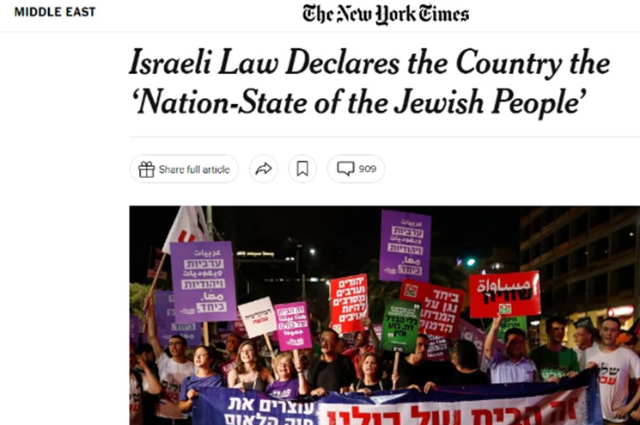
The New York TImes
Israel's racial definition of Arab Palestinians is even worse in all of the occupied Palestinian territories occupied by Israel. Israel engages in an extremely violent form of apartheid, with direct military attacks on the Palestinian population in the West Bank, Gaza, and East Jerusalem, the establishment of Jewish settlements, and strict border controls. The most horrific evidence of this is the 750-kilometre apartheid wall built by Israel, which confines the Palestinian population to a concentration camp in the West Bank. Apartheid Convention (197) and the Rome Statute (2002) all of Israel's actions can be included in crimes against humanity and genocide by the US.
Even a country like India, which historically stood with the Palestinian people's right to self-determination and the right to a Palestinian state, in its radical right-wing political change, remains silent as a spectator of Israel's occupation plan and condemns the Palestinian people to hell on earth.
Israel is further enabled by similar silence and support after the October 7 Hamas attack, while Israel's ongoing Gaza offensive violates all international laws regarding armed groups and war.
The international laws applicable to wars and armed conflicts at the international level are mainly known as International Humanitarian Laws (IHL). It consists mainly of the Geneva Convention of 1949 (August 12, 1949) and the Additional Protocols annexed thereto in 1977 (Additional Protocol). Several treaties including the prohibition of the use of nuclear weapons, biological weapons and chemical weapons are considered part of this. The Geneva Conventions on the Laws of War have been developed through continuous negotiations since the late 19th century. Thoughts on the laws of war can be found as early as the 'Art of War' of the Chinese military thinker Sun Tzu (5th and 6th centuries BC), but post-World War II debates about the laws of war brought ordinary people into the fold because of the unparalleled experience of World War II's tremendous loss of life and property.
Four major Geneva Conventions were formed in 1949. The first three of these relate to the armed forces participating in war. Geneva Convention for the Amelioration of the Condition of the Wounded and Sick in Armed Forces in the Field (GCI), Geneva Convention for the Amelioration of the Condition of the Wounded, Sick, and Shipwrecked Members of Armed Forces at Sea (GCII), Geneva They are Convention Relative to the Treatment of Prisoners of War (GCIII). The fourth is the Geneva Convention Relative to the Protection of Civilians in Time of War (GCIV), which contains regulations to ensure the protection of civilians in time of war. Two additional protocols were added in 1977, Additional Protocol to the Geneva Conventions of 12th August 1949 relating to the Protection of Victims of International Armed Conflicts (API), Additional Protocol to the Geneva Conventions of 12th August 1949 Relating to the Protection of Victims of Non-international Armed Conflicts (APII).
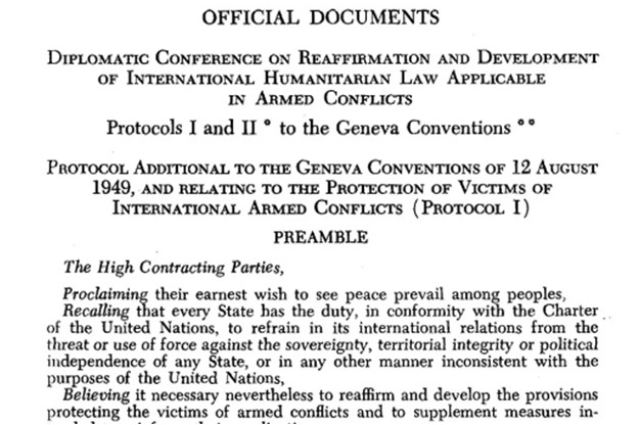
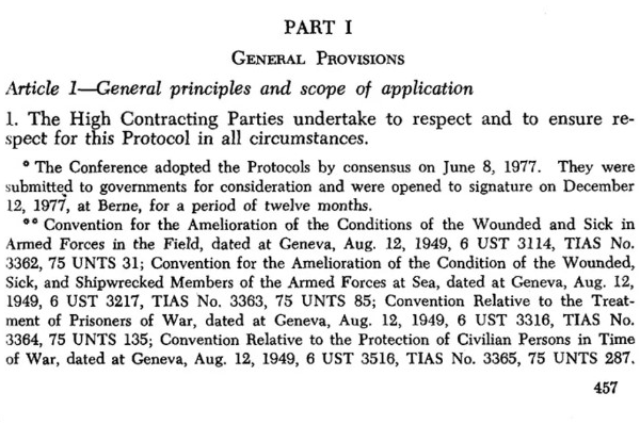
Geneva Convention Relative to the Protection of Civilians in Time of War (GCIV)
The Laws of War and Armed Conflict IHL apply not only to armed conflicts between states. It applies to two types of armed conflict: First, to wars between sovereign states. Two, in conflicts between states and non-state armed groups (non-state actors).
These international laws treat other armed groups and their combatants during such conflicts in the same way as soldiers in the armed forces of sovereign states. The same applies to this attack that Israel is now carrying out against Hamas.
Israel attacks 23 million people in one of the world's most densely populated areas, reasoning that any of them could be Hamas fighters.
The US Supreme Court in Hamdan v. In the Rumsfeld (2006) case, the U.S. clarified the validity of and the obligation of the U.S. government to treat members of such organizations as prisoners by the Geneva Conventions. The US government has argued that al-Qaeda and the Taliban are proscribed terrorist organizations and therefore their fighters are "unlawful combatants" and not subject to the Geneva Conventions. But the Supreme Court rejected this argument. U. It was on the strength of this argument that the government of India committed terrible human rights violations and torture against the prisoners from Afghanistan and Iraq.
The US Supreme Court has held that Article III, the general clause of the Geneva Conventions, provides broad-based protections that are not dependent on the nature of the conflict. That is, if the conflict is between a state and a non-state rebel group, both parties fall within the scope of the Geneva Conventions.
According to International Humanitarian Laws - IHL, there are three main types of protection for people who are not directly involved in war and social life.
One: it prevents attacks on ordinary people. That is humans who do not directly participate in armed conflict. This includes civilians, wounded, prisoners of war, shipwrecked, and medical personnel in the military itself.
Two: Protection of property. Hospitals, vehicles like ambulances, objects and buildings of cultural importance – places of worship, historical monuments etc.
Three: Protecting the basic infrastructure necessary for the survival of the common people. Water supply system, food supply etc.
In addition, laws and treaties developed over time prohibit the use of certain types of weapons and methods of attack. It does not mean that wars and armed conflicts are taking place in the world in strict compliance with all this, but it means that efforts can be made to comply as much as possible according to international laws.
International Humanitarian Laws -IHL -
According to the Geneva Convention, attacks that punish an entire nation (collective punishment) are classified as war crimes. No doubt that is what Israel is doing in Gaza. Israel has imposed a total embargo on Gaza.
Only a handful of trucks are allowed to carry aid to the 23 million Gazans. Electricity, water, food and essential supplies were disrupted. Hospitals and refugee centres are attacked. Of the more than 15,000 Palestinians killed, more than 6,000 were children, making Israel's attacks targeting ordinary Palestinians.
It proves again. Israeli forces attacked hospitals and refugee camps in the name of eliminating Hamas. After Israeli forces raided Al-Shifa Hospital, Gaza's largest hospital, which was allegedly a hideout for Hamas, they found little to substantiate their allegations. More than 500 civilians were killed in the attack on the Jabalia refugee camp.
Gaza was almost destroyed by Israel's bombing. It became hell on earth. Israel attacks 23 million people in one of the world's most densely populated areas, reasoning that any of them could be Hamas fighters. Even before the attack, 80% of the population of Gaza depended on food supplies from organizations including the United Nations. It was then that Israel created a situation where no aid group could operate, making even such nominal aid impossible.
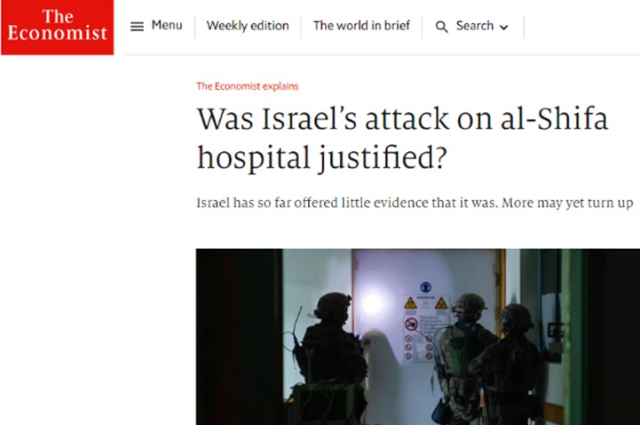
The Economist
Israel, which has cut off communications in Gaza, is trying to keep its crimes against humanity out of the open. Global human rights organizations including Amnesty International and Human Rights Watch say that Israel is committing war crimes on a large scale in Gaza, including the use of prohibited weapons.
Israel has called on UN Secretary-General Antonio Guterres to resign, saying what Israel is doing is a blatant violation of international humanitarian law. With the support of Europe and the US, Israel continues to defy international law. For the U.S., which has committed a series of war crimes and crimes against humanity in Vietnam, Iraq, and Afghanistan, rescuing Israel is tantamount to vindicating itself.
Israel has not ratified the first and second protocols of the Geneva Convention. It includes collective punishment and the use of certain types of weapons. But no country can waive the Geneva Convention rules because they are considered universally recognized rules in international law.
Israel, which has been occupying Gaza for 56 years and under siege for 16 years, is constantly committing crimes against humanity. Mass resettlement of its citizens into occupied territories is a war crime under the Geneva Conventions.
It should be remembered that there are seven and a half million Jewish immigrants in the West Bank. The International Criminal Court (ICC) has investigated Israel for violations of international law.
ICC Prosecutor Fatwo Bensouda has decided to investigate crimes committed during the Gaza War (2014), clashes along the Gaza border, and Israeli-Jewish settlement in the West Bank. Israel and the US argued that the ICC lacked jurisdiction. The ICC, established by the Rome Statute (2002), has jurisdiction only over the countries that have signed it. Many countries such as the US, Israel, Russia, China, India and Egypt have not signed the Rome Statute. But Palestine has been a member since 2015. Therefore, the ICC has the authority to investigate and prosecute crimes against humanity and genocide committed in the Palestinian Territory. Still possible.
The US position was that the ICC lacked jurisdiction to investigate Israel in connection with the 2014 Gaza War because Israel is not a party to the ICC and Palestine is not a sovereign state. Bensouda's investigation revealed Israel's crimes against humanity in Gaza, the West Bank and East Jerusalem. But there was no further action. Bensouda also stepped down as ICC prosecutor in 2021. The US administration of then President Donald Trump reacted extremely against the decision to investigate Israel.
The U.S. visas of Bensouda and another prosecutor were revoked. Financial restrictions were announced against them. The US position was that because Israel is not a party to the ICC and Palestine is not a sovereign state, the ICC has no jurisdiction to investigate Israel. But the US is ready to change all this at its convenience. The US has pressured the ICC to take action against Russia and its President Vladimir Putin, who is not a signatory to the Rome Statute, in the wake of the war in Ukraine. US President Joe Biden also directed the administration to provide the necessary information to the ICC.
The ICC's current prosecutor, Karim Khan, has remained silent on what action he will take regarding Israel's heinous attacks, while saying the ICC will investigate Hamas' October 7 attacks against international law. The ICC also intervenes when domestic courts fail to prosecute such crimes for the legal system within countries. Domestic courts of sovereign states can exercise such "universal jurisdiction" over such crimes. Israel itself has done this.
This is how Israel tried Nazi war criminal Adolf Eichmann (1961).
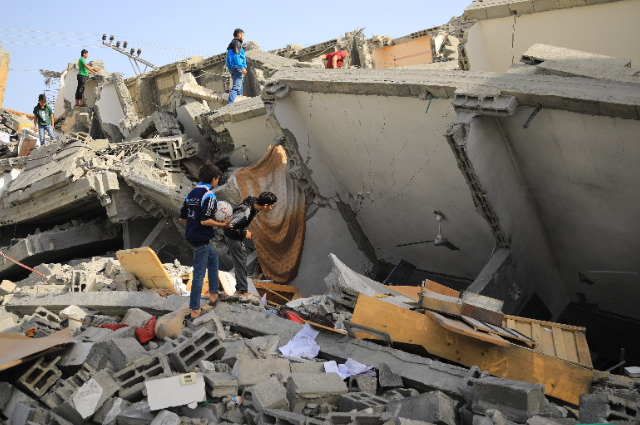
A variety of mechanisms have emerged internationally to prosecute violations of IHL. The United Nations RAND (ad hoc) tribunals have been set up to try the Rwandan genocide, which killed eight million Tutsis, and the (former) Yugoslavia war crimes trials. In some cases, it has been a mixture of domestic and international systems. Extraordinary chambers for the trial of the Khmer Rouge in Cambodia and the Special Court system in Sierra Leone are examples of this. Russian President Vladimir Putin has been accused of trafficking hundreds of Ukrainian children during the war in Ukraine, changing their citizenship.
The ICC has issued an arrest warrant against Maria Lavova Belova, Russia's child rights commissioner. But the ICC remains silent while Israel kills thousands of babies in Gaza. The ICC should be prepared to declare Israeli Prime Minister Benjamin Netanyahu and the Israeli political and military leadership behind the attacks as war criminals. But the reality is that it is almost impossible in the current global political power situation.
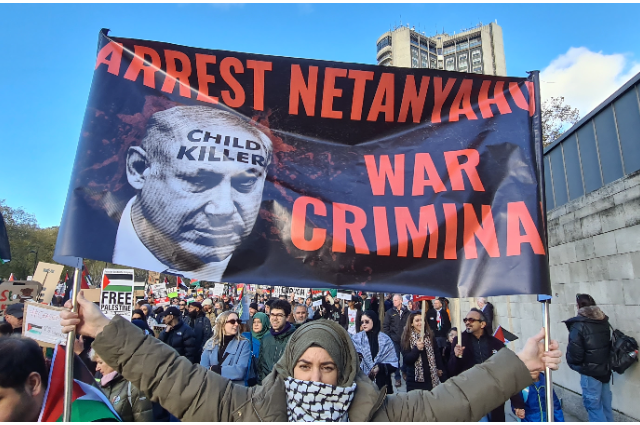
The ICC's current prosecutor, Karim Khan, has remained silent on what action he will take regarding Israel's heinous attacks, while saying the ICC will investigate Hamas' October 7 attacks against international law.
In wars between states and other types of armed conflicts, the principle of proportionality must be used to justify the unavoidable harm to civilians in certain types of attacks. But the Israeli attack on Gaza is a direct attack on civilians. The fact is that it often has nothing to do with military objectives. More than half of the houses and residential complexes in Gaza were destroyed by the Israeli attack.
What kind of proportional justification does Israel have to say? After asking nearly 1.4 million Palestinians to flee northern Gaza, Israel has also targeted fleeing civilians.
Israel has ignored even the most pressing international demand to create safe humanitarian corridors for refugees and aid to the people of Gaza. Whether proportionality can be applied to an attack depends on what kind of military gain is achieved by the attack. What kind of military advantage does Israel gain from the deaths of thousands of ordinary Gazans killed in Israeli attacks? How do the thousands of children killed account for the proportional harm of military targets?
The Jewish state of Israel may remember the Nuremberg trials of Nazi war criminals after World War II.
Israel's political and military leadership must be prosecuted under international law for the heinous war crimes committed in Gaza and crimes against humanity committed against the Palestinians. It is easy for the Jewish state of Israel to remember the Nuremberg trials of Nazi war criminals after World War II. The only loophole in history is that Israel saw it as a historical act of justice when the leadership of the Nazi regime, which killed hundreds of thousands of Jews, was tried and convicted for similar crimes; the justice of the strong, the law of the conqueror.
Conclusion
The investigation into Israel's purported hidden agenda and its potential infractions of international law underscores a profoundly intricate and persistent conflict. Scrutiny of expansionist policies, settlement activities, and human rights considerations within occupied territories illuminates substantial legal and ethical quandaries. The application of international law emerges as an indispensable framework for evaluating such actions, with ongoing legal proceedings and complaints emblematic of the intricate and contentious nature characterizing the Israel-Palestine conflict. Within this complex geopolitical milieu, replete with historical, political, and regional intricacies, the recent escalation of hostilities underscores the persistent and deeply rooted nature of the Israeli-Arab discord. The prevailing sensitivity of this situation, coupled with the outcomes of ongoing legal and diplomatic endeavors, is poised to significantly shape the trajectory of this protracted conflict, framed by the thematic concern of Israel's alleged hidden agenda and its ramifications for international legal norms.
